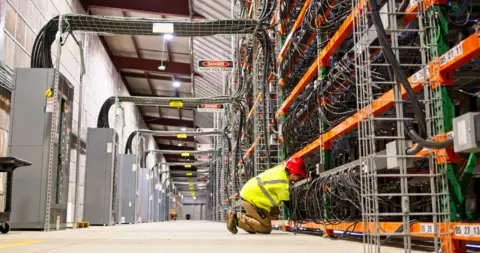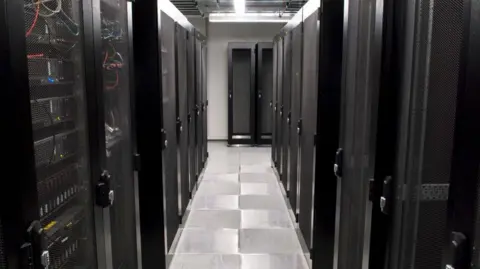Scottish data centres powering AI already using enough water to fill 27 million bottles a year

Georgina HayesBBC Scotland
 Getty Images
Getty ImagesData centres powering artificial intelligence (AI) in Scotland are using enough tap water to fill 27 million half-litre bottles a year, according to data obtained by BBC News.
AI systems such as the large language models (LLMs) that power OpenAI’s ChatGPT and Google’s Gemini require warehouses full of specialist computers.
The equipment is power-hungry, consuming large amounts of energy, but they also use tonnes of water in their cooling systems to stop the servers overheating.
Freedom of Information data shows the volume of tap water used by Scotland’s data centres has quadrupled since 2021.
There are currently 16 data centres in Scotland and this number is set to increase in the years to come.
Such centres have been powering the digital world for years – running everything from movie streaming to online banking – but the boom in generative AI tools has rapidly increased the amount of energy and water they use.
In an interview with BBC Scotland News, Scottish Water described the increase in tap water used by data centres as “significant” – although it pointed out that it still only amounts to about 0.005% of the water supply.
As AI booms – with 60% of the UK population already using it – Scottish Water wants the sector to look at sustainable alternatives such as wastewater systems.
“We would like to try to look for other alternative solutions rather than using precious tap water”, operations manager Colin Lindsay said.

The BBC understands that the majority of data centres in Scotland currently use “open loop” systems, which need a constant supply of mains water.
However, the industry is moving to towards more efficient methods such as “closed loop”, meaning they would recirculate a fixed amount of water.
Mr Lindsay said: “Open loop systems use enormous amounts of water.
“We’re working with developers on a case-by-case basis to explore sustainable water sources to reduce demand on public drinking water.”
He said closed-loop cooling systems could increase energy use so Scottish Water were encouraging open-loop systems near wastewater treatment works.
These would use treated effluent to supply the volumes of water needed and minimise energy use.
In the UK alone, it’s estimated that another 100 data centres will be built over the next few years to meet the demand for AI processing.
The tech industry does not release figures on water consumption – and all Scottish data centres contacted for this article did not respond to our inquiries.
It is estimated that 10-50 responses using AI model GPT-3 could consume 500ml of water.
Experts at the University of Glasgow said the figures, revealed by BBC News, suggested that the water consumed by data centres in Scotland was equivalent to every person in the country drinking an extra 2.48 litres a year.
By another measure, it amounts to more than 27 million 500ml water bottles.
The university modelling also found the carbon footprint of these data centres could be the equivalent of every person in the country driving up to an extra 90 miles, or 145 kilometres, every single year.
This is before any expansion in data centres in Scotland.
And it does not account for the environment impact in the rest of the world of Scottish AI users.

“These figures are very significant,” said Prof Ana Basiri, director of university’s Centre for Data Science and AI.
“There is a huge amount of carbon dioxide emissions and water use related to data centres that we often forget about because it is not a very visible thing,” she said.
Many data centres are privately funded by US tech giants, such as Google and Microsoft, and major investment firms.
But most current owners do not share data about their environmental impact, something Prof Basiri said needed to change.
She added: “We can’t really measure this because, of course, there is not necessarily a big mandate from the government to report on the detail of the energy or water use of data centres or other big tech companies that exist and that’s a massive challenge.”
Prof Basiri said one way to ensure that data centres were more sustainable would be to set carbon targets for companies and impose tax penalties for exceeding them.
The academic said the power used by an AI tool, such as ChatGPT or Google’s Gemini, was about 13 times higher than a simple Google search.
She said ordinary people could play their part by considering their “AI footprint”.
Prof Basiri added: “For example, reducing the number of times we go to these AI chatbot systems when a Google search would be efficient or considering how you use image generation, or what you attach to an email.”
 Getty Images
Getty ImagesThe UK is already thought to be the third-largest nation for data centres behind the US and Germany.
The UK government has made clear it believes data centres – which have been designated critical national infrastructure alongside the emergency services and healthcare systems – are central to Britain’s economic future.
Despite concerns, Scotland has also been touted as a prime location for the development of “green” data centres.
This is because of its cool climate, abundance in renewable energy, and efficient grid.
‘Considerable thought’
OpenAI, the owner of ChatGPT, said it gives “considerable thought” to supporting sustainability efforts and “water-positive” goals.
The company said it had several global projects under way in this area.
This included a data centre in Norway which will “run entirely on renewable power” and is “expected” to use closed loop systems.
It added that it believes AI will also be “instrumental” in tackling climate change by “accelerating scientific discovery”.
A Scottish government spokesperson said: “Alongside Team Scotland partners, the Scottish government is supporting initiatives to transform Scotland into a global centre for AI – driven by our capacity for renewable energy generation, strong local tech ecosystems and easy access to local talent and world-class academia.
“However it is vital that the sector grows sustainably in a way which doesn’t impact on Scotland’s natural resources or net zero ambitions.”
They added Scottish Water was a statutory consultee on all data centre planning applications.
The spokesperson concluded: “Developers are encouraged to adopt measures such as ‘closed loop’ water systems, which seek to reuse water in data centres and minimise demand or use sustainable alternatives such as the use of treated final effluent as a sustainable water source.”

